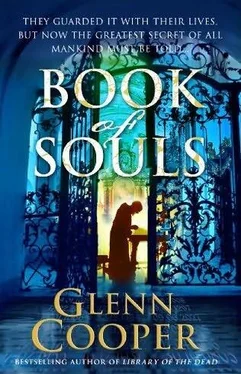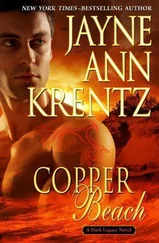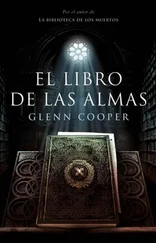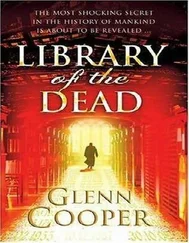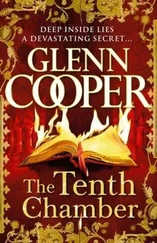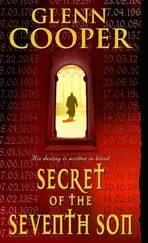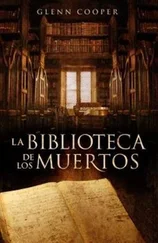Glenn Cooper - Book of Souls
Здесь есть возможность читать онлайн «Glenn Cooper - Book of Souls» весь текст электронной книги совершенно бесплатно (целиком полную версию без сокращений). В некоторых случаях можно слушать аудио, скачать через торрент в формате fb2 и присутствует краткое содержание. Жанр: Триллер, на английском языке. Описание произведения, (предисловие) а так же отзывы посетителей доступны на портале библиотеки ЛибКат.
- Название:Book of Souls
- Автор:
- Жанр:
- Год:неизвестен
- ISBN:нет данных
- Рейтинг книги:5 / 5. Голосов: 1
-
Избранное:Добавить в избранное
- Отзывы:
-
Ваша оценка:
- 100
- 1
- 2
- 3
- 4
- 5
Book of Souls: краткое содержание, описание и аннотация
Предлагаем к чтению аннотацию, описание, краткое содержание или предисловие (зависит от того, что написал сам автор книги «Book of Souls»). Если вы не нашли необходимую информацию о книге — напишите в комментариях, мы постараемся отыскать её.
Book of Souls — читать онлайн бесплатно полную книгу (весь текст) целиком
Ниже представлен текст книги, разбитый по страницам. Система сохранения места последней прочитанной страницы, позволяет с удобством читать онлайн бесплатно книгу «Book of Souls», без необходимости каждый раз заново искать на чём Вы остановились. Поставьте закладку, и сможете в любой момент перейти на страницу, на которой закончили чтение.
Интервал:
Закладка:
King Edward’s Reformation was harsher than his father’s, and all vestiges of the Papacy were purged from the countryside. The business of dismantling Catholic churches was completed in an orgy of shattered stained glass, broken statues, and burned vestments. The clergy were released from celibacy, processions were banned, ashes and palms were prohibited, stone altars were replaced by wooden communion tables. Edgar’s friend Calvin, in far-off Geneva, was exerting a profound influence on the English Isles. Edgar’s tiny Notre Dame chapel survived the tumult only because it was on private land, and he was a powerful and discreet noble.
For a time, the pendulum swung in the other direction when Queen Mary succeeded her brother and reigned for five brief years. Mary zealously sought to restore the Catholic faith. So it was Protestant men who were being seized and burned at the stake. Edgar deftly rediscovered his papist roots, marrying his second wife, Juliana, who hailed from a Stratford-upon-Avon family of closeted Catholics. Juliana, almost fifteen years his junior, began to bear him children, and his two daughters were ushered into the world as Catholics.
Then the pendulum moved once again. In 1558, Mary was dead, her sister, Elizabeth became queen and England once again became a Protestant reign. Edgar shrugged it off and became Protestant again, closing his ears to the entreaties of his wife, who nevertheless, continued to take secret mass in their chapel and educate her daughters with the Latin Bible. Though advanced in years, he finally sired a son whom his wife baptized, John, in a clandestine Catholic ceremony. Five years later, Richard was born, and Juliana’s life was lost amidst Edgar’s salty tears.
Now, in his old age, the exertions of living a life as a political and religious chameleon had taken their toll. He was hobbled by infirmities and rarely left Cantwell Hall. He hadn’t been to Court in two years, and he supposed the queen had forgotten he existed. But most of all, he obsessed about his ne’er-do-well son.
It was a hot summer day, but Edgar was perpetually cold. He insisted on sitting by his small bedroom fire, his shoulders covered by a shawl, his legs wrapped in a blanket. His appetite was naught, and his bowels were persistently liquid, which he attributed to the remedies his dolt of a country apothecary was administering for the gout. If the old healer Nostradamus were still alive, he would have begged him to travel to England to attend to his maladies.
From the garden below his window, he heard a burst of male laughter and cavorting, and when he clenched his infected jaw in anger, the pain almost toppled him from his chair. He drank the rest of the wine from his flagon in quick, large gulps, staining his chin red. Better his brain be dulled than to suffer this mental and physical anguish. He wished he possessed the book from Vectis, which contained the date he would die so he could know how much longer he had to suffer. His son was laughing again, prattling on like a girl.
John was drunkenly enjoying a glorious high-summer day where the grass was thick and green, the sun hot and yellow, and the flowers in the garden a blazing inferno of color. He was playing at archery, the hay-stuffed targets safe from his misguided arrows. Each time he missed, his friend literally fell to the grass in hysterics.
“Bugger yourself, Will,” John cried. “You can do no better!”
John, though young, already had the thick body of a commoner-a drinker and a brawler rather than a gentleman or scholar. Like some of the youths of the day, he was clean-shaven, which as far as his father was concerned, made his face look naked. The Cantwell chin looked better under a beard, and the young man was no beauty. The beaky Cantwell nose didn’t sit well between his watery eyes and fleshy cheeks, and his lips were pursed in a perpetual leer. During his woeful two years at Oxford before he was expelled for rioting, the ladies at his brothel dreaded being chosen by the violent oaf.
His friend was a more genteel sort. He was seventeen, wiry and muscular with an intelligent face and the earnest beginnings of a moustache and goatee. His long black hair flowed over his collar and looked like ebony against the hue of his smooth skin. He had mischievous blue eyes and a winsome smile that never seemed to fade. His elocution was clear and precise, and he possessed a presence that demanded men take him seriously.
He had known John Cantwell since childhood, when both of them attended the King’s New School in Stratford. Though Will was far and away the superior student, Will’s father, a merchant, lacked the means to send him to university. When John was expelled from Oxford, he returned to his country seat and remade acquaintance with the lad. The two of them became fast friends again, reveling in each other’s bawdy company.
Will squirted ale into his mouth from a skin and seized the bow from his drunken companion. “Indeed I can do better, sir.”
He smoothly pulled the bowstring back, aimed, and let an arrow fly. It sailed true and straight and struck the target in its center.
John groaned loudly, “Damn you to Hades, Master Shakespeare.”
Will grinned at him and threw down the bow in favor of more ale.
“Let us go inside,” John said. “It is too hot for sport. To the library, your favorite spot!”
In truth, whenever Will entered the Cantwell library, he looked like a little boy who had stumbled upon a roomful of unguarded fruit pies. He made a straight line for one of his favorite books, Plutarch’s Lives, pulling it off a shelf and sinking into a large chair by the window.
“You should let me take this home, John,” he said. “I will make better use of it than you.”
John called the hall servant for more ale then flopped onto a divan, and replied, “You should steal it. Hide it under your shirt. I do not care.”
“Your father might.”
“I think he will never know. He does not read any longer. He does much of nothing. The only time he comes in here is to hold The Book in his lap and pet it like an old dog.” He said The Book with mock reverence. He pointed contemptuously at the book sitting in its pride of place on the first shelf, its spine engraved with the date, 1527.
Will laughed, “Ah, the magic book of Cantwell Hall.” Will affected a child’s voice, “Pray tell me, sir, when shall I meet my darkest fate?”
“Today if you do not shut your mouth.”
“And who will be the instrument of my death, knave?”
John sloshed more ale down. “You are looking into his eyes.”
“You?” Will laughed. “You and what legions?”
This was an invitation to wrestle, and both boys rose and circled, sniggered at each other. When Will charged to upend his friend, John reached for the first book his hand could grasp and flung it hard at the back of Will’s head.
“Ow!” Will stopped his charge, rubbed his occiput, then picked up the book from the floorboards. The pages had violently separated from the cover. “Ye Gods! A tragedy!” he cried melodramatically. “You have torn asunder a Greek tragedy and have awoken the wrath of Sophocles!”
A voice from the door startled them. “You ruined one of Father’s books!”
Young Richard was standing there, hands on hips, like an indignant lady. His lips were trembling with rage. None in the family was more attuned to the sentiments of his father, and he took personal umbrage with the behavior of his brother.
“Be gone, brat,” John said.
“I will not. You must confess to Father what you have done.”
“Leave us, little toad, or I will have more to confess than that.”
“I will not leave!” he said stubbornly.
“Then I will make you.”
John dashed for the door. The boy turned and fled but not fast enough. He was caught in the center of the Great Hall just before he was going to slip under the banqueting table.
Читать дальшеИнтервал:
Закладка:
Похожие книги на «Book of Souls»
Представляем Вашему вниманию похожие книги на «Book of Souls» списком для выбора. Мы отобрали схожую по названию и смыслу литературу в надежде предоставить читателям больше вариантов отыскать новые, интересные, ещё непрочитанные произведения.
Обсуждение, отзывы о книге «Book of Souls» и просто собственные мнения читателей. Оставьте ваши комментарии, напишите, что Вы думаете о произведении, его смысле или главных героях. Укажите что конкретно понравилось, а что нет, и почему Вы так считаете.
